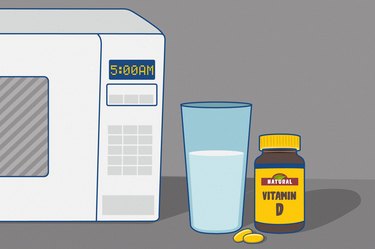
Taking gummy vitamins is one way to ensure you're meeting your daily nutritional needs, but there are some pros and cons you should know about before you reach for the bottle.
It makes sense to wonder if gummy vitamins are really good for you — after all, they taste like candy.
Video of the Day
Video of the Day
Experts say gummy vitamins can be good for you if you have a nutritional need for them, but you may want to look out for certain ingredients and additives.
"Gummy vitamins are easily digestible and can be effectively absorbed in the body," says registered dietitian Lauren O'Connor, RD. "But they may lose some potency over time, and many contain added sugars and artificial ingredients."
Below, we'll explain all the benefits and downsides of gummy vitamins.
Pros of Gummy Vitamins
1. They’re Easy to Take
Many people have problems swallowing pills, and tablets can have an unpleasant smell and taste.
Gummy vitamins offer a yummy, chewable alternative.
2. They’re Easy to Digest
You'll probably still want to take gummy vitamins with food, but they may be easier to digest than pills or tablets.
This is because gummy vitamins aren't made with the binding agents you'd find in traditional vitamins, per UCLA Health, so they're less likely to mess with your stomach.
3. They're Effective
Gummy vitamins have been shown to be just as effective as traditional pill supplements, according to UCLA Health.
Cons of Gummy Vitamins
1. Many Have Added Sugars
Eating too much sugar can put you at risk for serious health conditions like heart disease, diabetes and certain cancers, per the American Heart Association (AHA).
If you're trying to be mindful of added sugars in your diet, read the nutrition label on your gummy vitamins: Many will give you between 2 and 8 grams of sugar per serving, according to UCLA Health.
While that may not seem like a lot, the AHA recommends taking in no more than 25 to 36 grams of sugar daily, which can add up quickly if you're getting a third of that amount from your vitamins.
2. Sugar-Free Options May Contain Alternative Sweeteners
Yes, there are sugar-free gummy vitamins available. But to make them taste good, other ingredients, like sugar alcohols or artificial sweeteners, are typically added in.
"Sugar alcohols may have a laxative effect on some people, and some may experience digestive discomfort," O'Connor says.
Artificial sweeteners can also cause bloating, gas and diarrhea, per the Mayo Clinic, and some research has linked long-term use to a higher risk of stroke and heart disease (although more research is needed in this area).
3. They’re Often Made With Artificial Flavorings
Supplement manufacturers often use artificial flavoring and coloring to mask the metallic taste of nutrients like iron and vitamin B12, per UCLA Health.
If you're trying to limit artificial additives in your diet, gummy vitamins may not be for you.
4. They’re Less Shelf-Stable Than Pills
Gummy vitamins have a limited shelf life compared to other types of supplements, and they lose their potency over time, per UCLA Health.
To address this, manufacturers often make gummy vitamins with more vitamins than listed on the bottle. So, a newly packed bottle may be more potent than an older bottle.
Supplements and vitamins are not well-regulated by the FDA, O'Connor notes, so it can be difficult to know how much of a nutrient you're actually getting. "Manufacturing practices, loss of stability and when you take it (relative to its expiry date) can make a difference," she says.
One way to recognize a quality vitamin brand is to look for a third-party certification on its label, which means the product has been tested by an independent quality control group. The most common third-party certifiers include USP, NSF and Consumer Lab.
Still, even if a gummy vitamin was third-party certified during manufacturing, its properties may change over time.
5. There’s a Higher Risk of Overdosing
Gummy vitamins may taste like a treat, but you should be careful not to snack on them.
"It is easier to overdose on gummy vitamins because they are easy to chew and taste like candy," O'Connor says. "You should always double-check the label for the serving size."
"Water-soluble vitamins like vitamin C will likely be excreted through urine, but if you are taking a product that has fat-soluble vitamins such as vitamin D, it can build up in your system over time and cause issues," O'Connor adds.
It's also possible to overdose on certain minerals, like iron and zinc, per UCLA Health. With a vitamin overdose, you may experience diarrhea and vomiting. Over the long term, mineral overdoses can lead to liver problems.
Alternatives to Gummy Vitamins
For people who have trouble swallowing pills and need an alternative to gummy vitamins, ask your doctor if liquids or chewables are right for you.
"Liquid vitamins or chewable tablets may be suitable alternatives to gummy vitamins for those who have difficulty swallowing pills," O'Connor says. "Just be aware that, like gummy vitamins, these are also more likely to contain added sugars and artificial dyes to make them more palatable and appealing."
Always read the nutrition label for dosage, ingredients and other additives when choosing a vitamin supplement.
So, How Bad Is It Really to Take Gummy Vitamins?
The truth is the same as it is with all supplements: You probably don't need to take gummy vitamins if you're already eating a balanced diet.
But if your doctor recommends taking a supplement to help you meet your nutritional needs, make sure to consider all the pros and cons of gummy vitamins before assuming they're healthy.
If you decide gummy vitamins are right for you, follow these tips from UCLA Health for choosing a good product:
- Talk to your doctor about which nutrients you need and how much (dosage).
- Always read the nutrition label and look out for added sugar.
- Choose gummies that are third-party tested (look for a certification stamp on the packaging) and made by trusted brands.
- Check the expiration date on your bottle.
- Stick to the recommended dosage and avoid taking too much.



